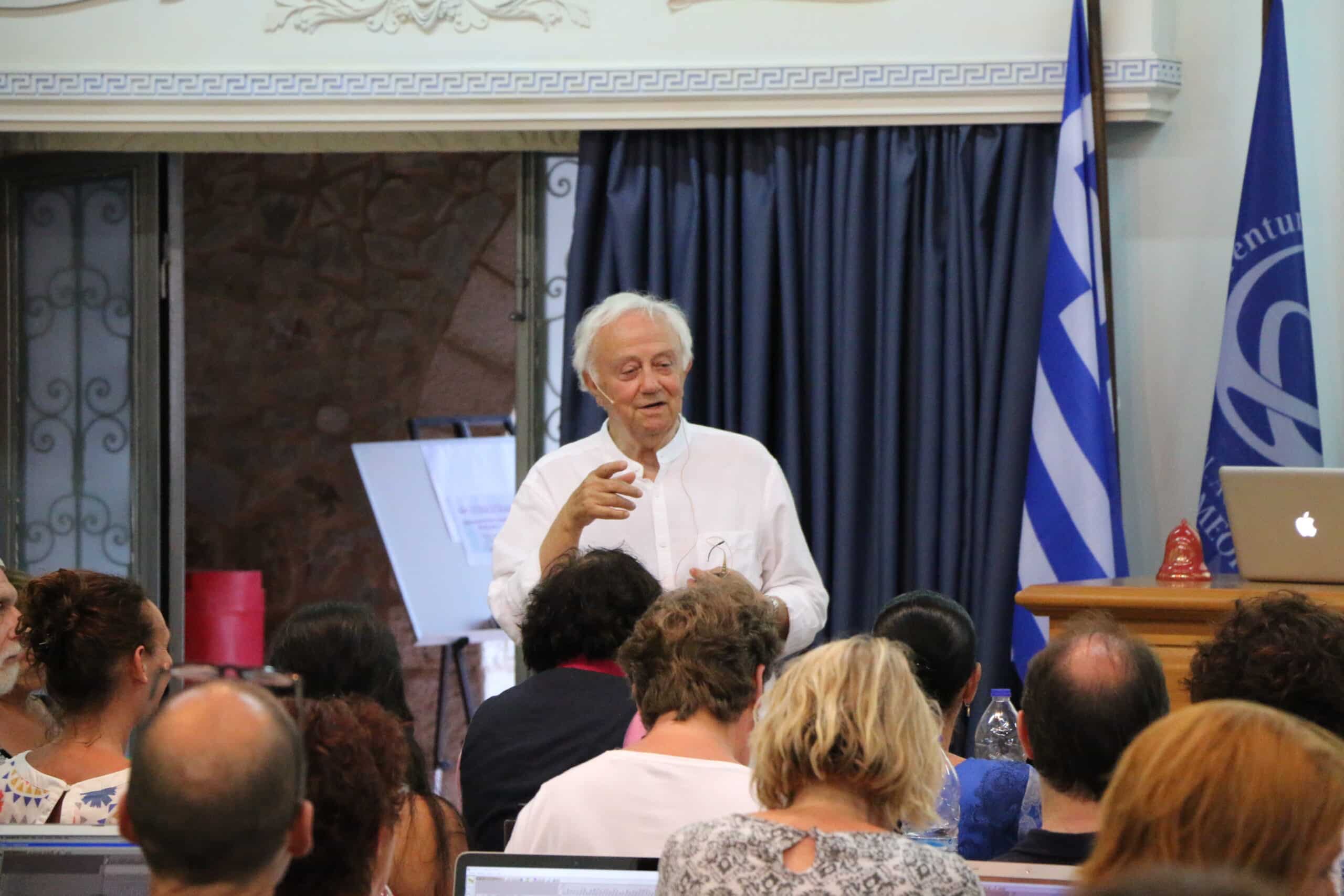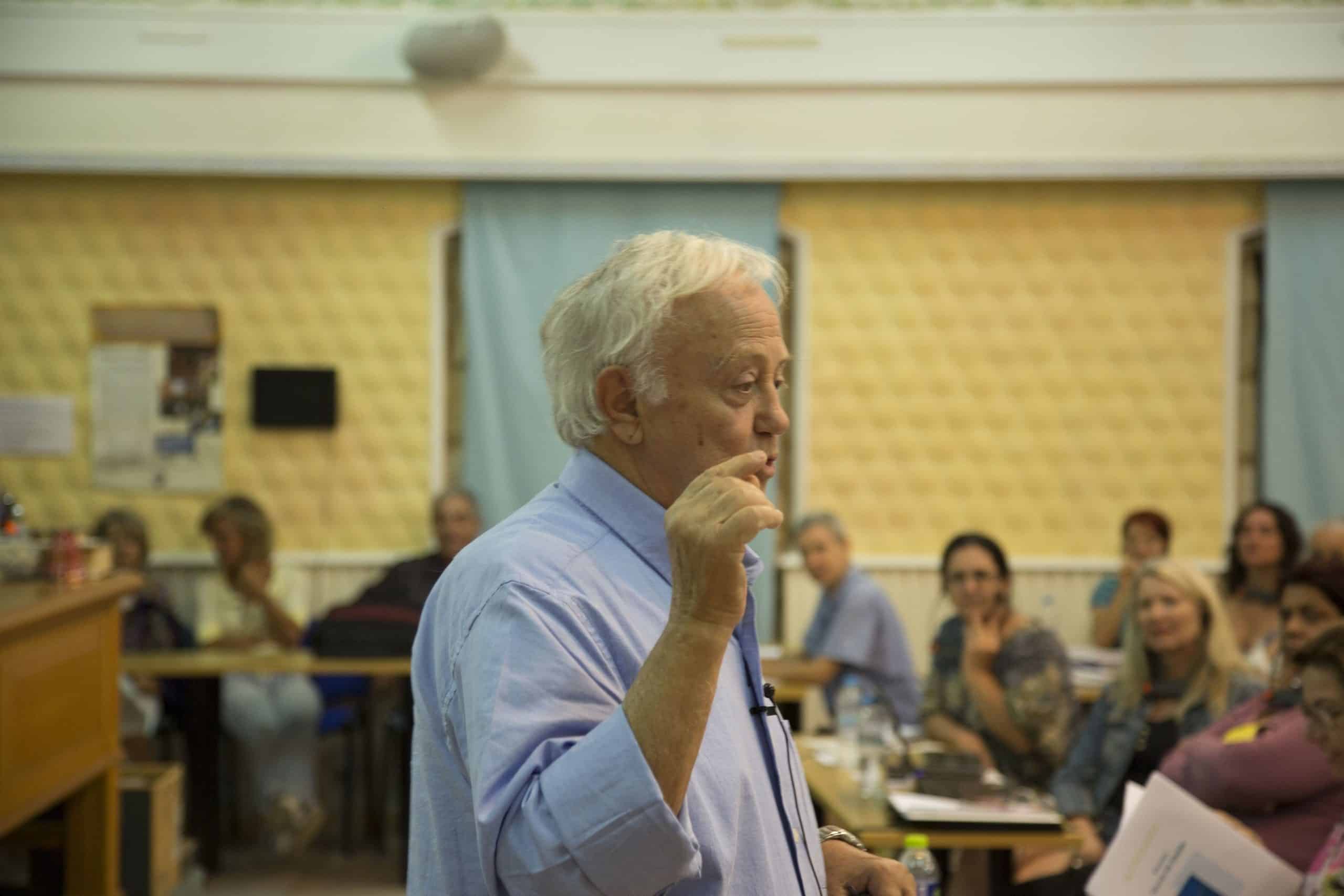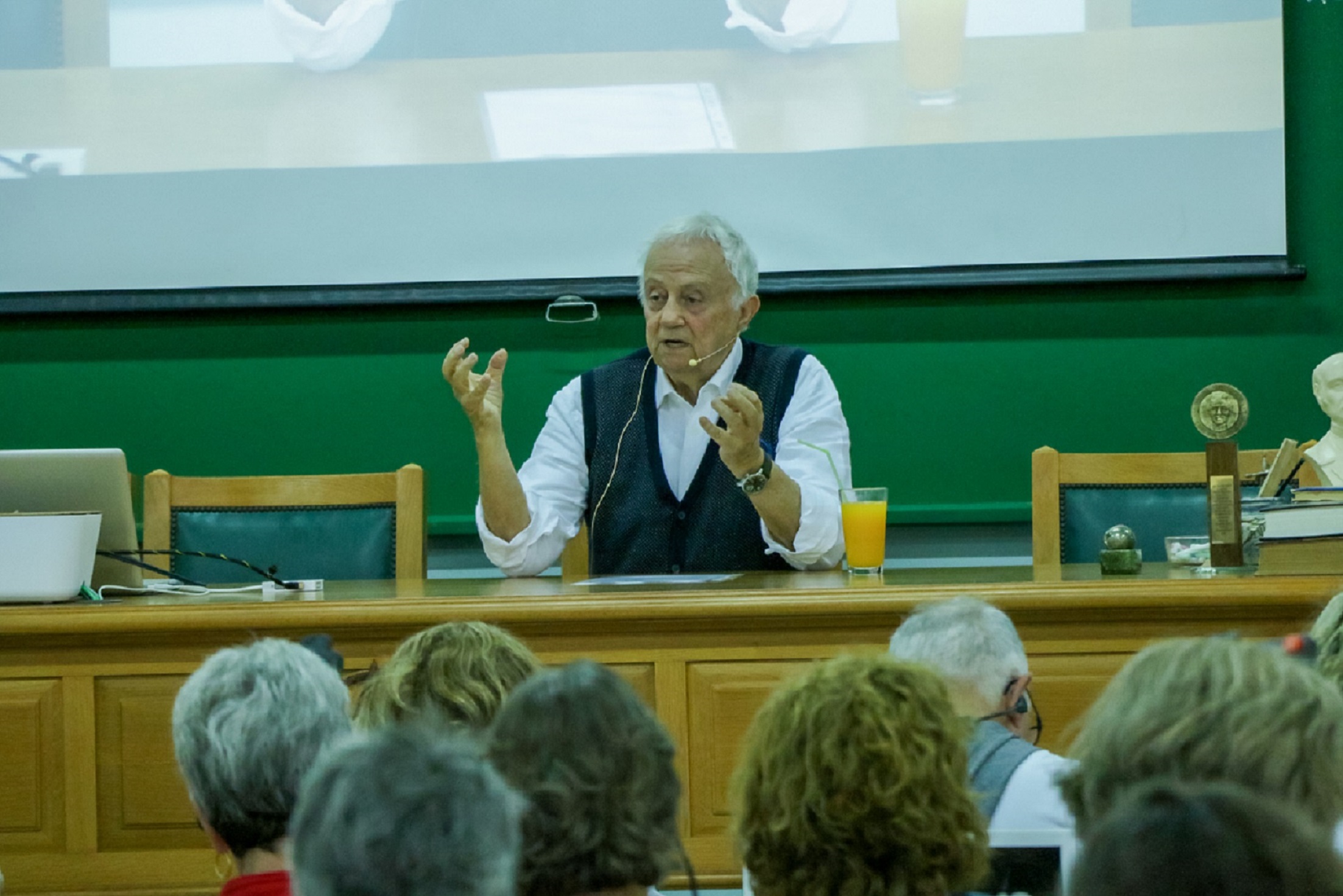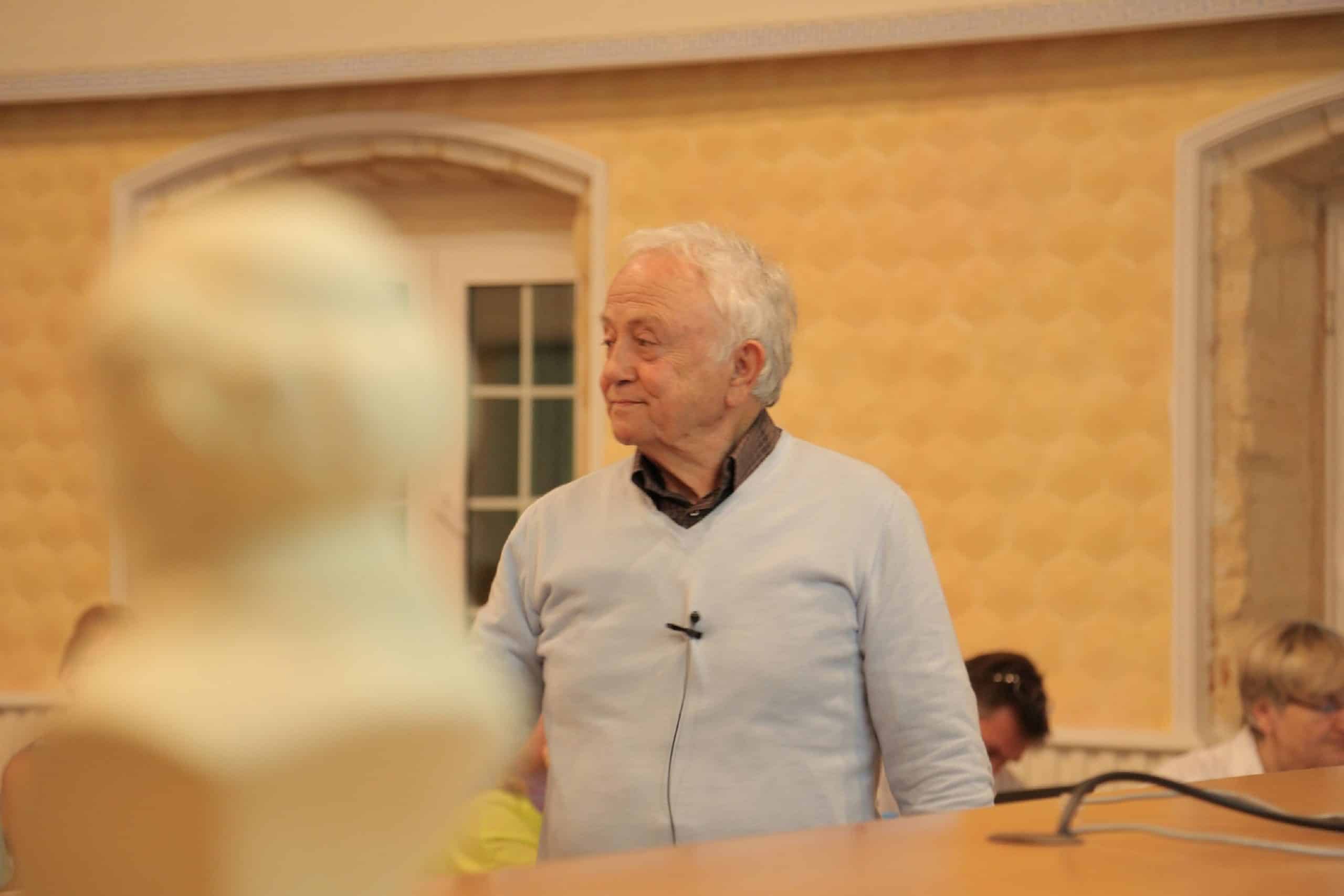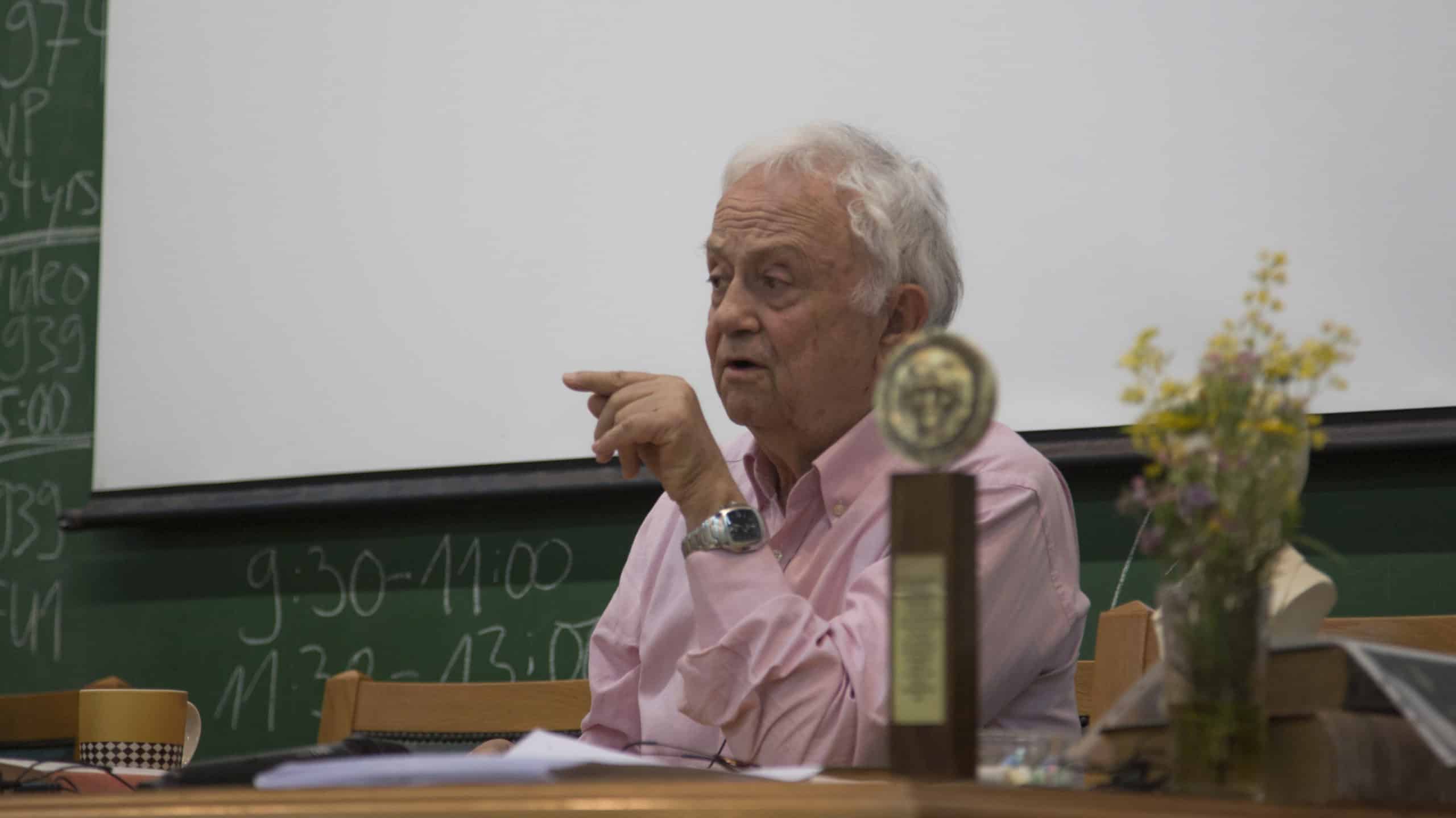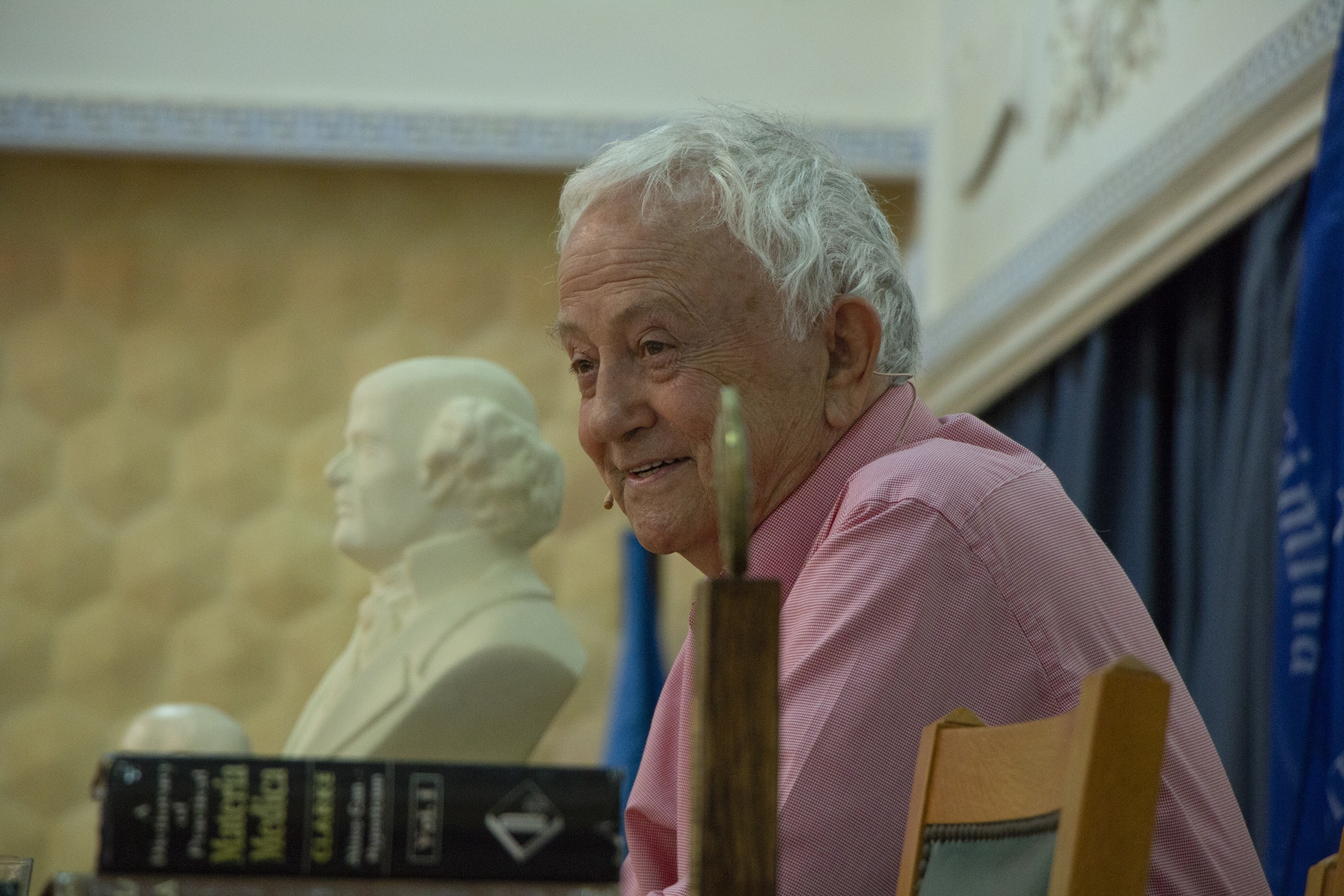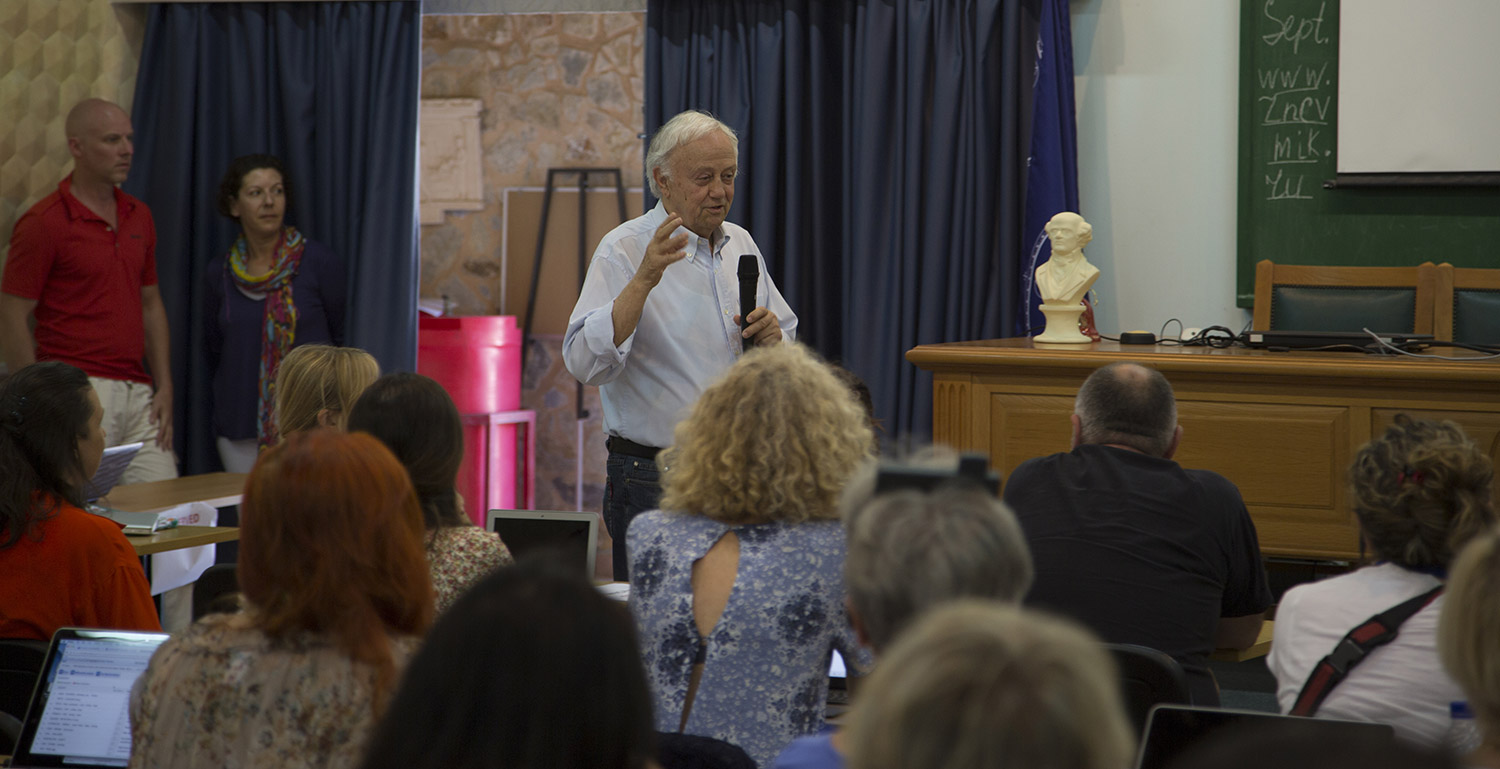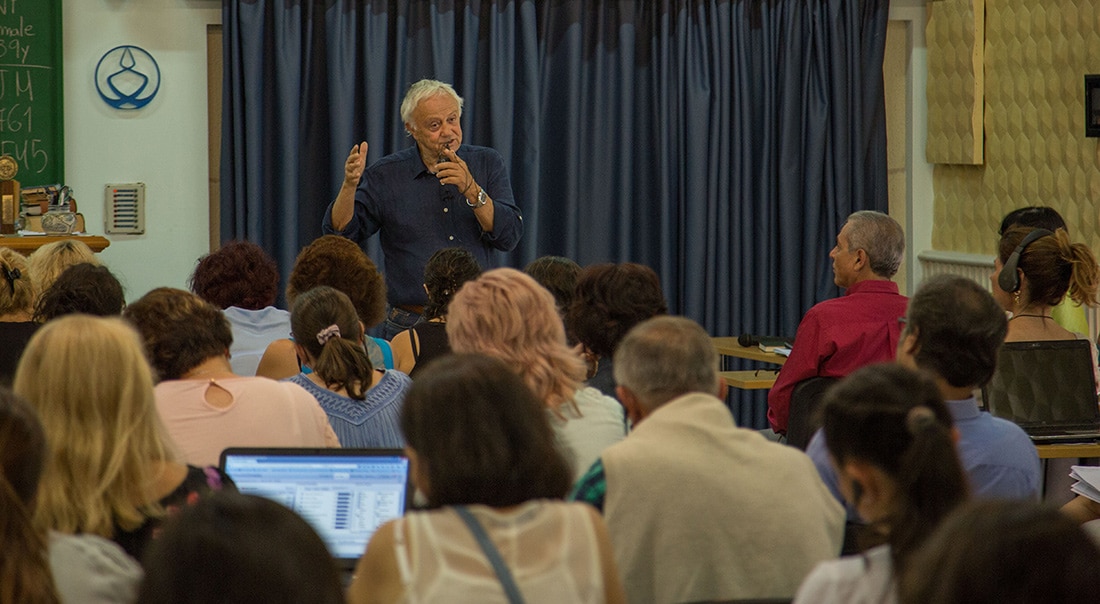To Peter Clotten for the German Medical Journal SECURVITAL Sept-Oct. 2001
The German physician Christian Samuel Hahnemann founded homeopathy. Meysen 1755-Paris 1843.
Interview of Prof. George Vithoulkas
To Peter Clotten for the German Medical Journal SECURVITAL Sept-Oct. 2001
The German physician Christian Samuel Hahnemann founded homeopathy. Meysen 1755-Paris 1843.
The term Homeopathy comes from the Greek meaning similar (ïìïéïò) pathology. Which in practical terms means that a remedy will cure only the symptoms that can produce in a healthy organism.
The basic difference of the two approaches the conventional and the homeopathic is the following: Conventional medicine considers that the cause of the disease are the disease producing agents (bacteria, microbes virus etc) that have to be destroyed by a chemical substance. Homeopathy maintains that the cause of the disease is the predisposition, or the weakness of the defence mechanism to fight these agents therefore we should reinforce the organism’s defence mechanism that can then bring back the balance.
This is accomplished by giving substances that have produced similar symptoms with those of the patient when they were tested on the healthy human organisms.
This principle though it sounds simple it is highly effective when the practitioner has the ability to spot the exact remedy, the personal remedy of the patient.
P. Are both approaches the conventional and the homeopathic necessary for a better system of health or do you think that only homeopathy should be practised.
There is no question that both therapeutic approaches are necessary.
Each of them in different situations.
In this matter there is a great misunderstanding. Many homeopaths claim that homeopathy could cure everything while others believe that can cure nothing.
The truth of the matter is in between. Homeopathy is indicated and is effective in the first stages of chronic diseases, where the problem is still mostly functional, but if the pathology has progressed after many years so far as to cause structural changes then the use of conventional medicine will be necessary.
The misunderstanding is due to the fact that the two sides never came really in to discussing this matter seriously. If they had communicated properly they would have found out that the one side does not enter in to the field of action of the other.
P. In this case what is the use of homeopathy if still conventional medicine is needed as much as before.
In the beginning stages where diseases are still functional, conventional medicine cannot do anything, and therefore cannot prevent the chronic condition from developing in to structural changes. Homeopathy should enter in to these beginning stages as it can prevent the disease from developing.
The great advantage is that homeopathy, if practised properly, will re-establish order and will arrest the further development of the chronic condition. In this way, on the long run, there is a tremendous profit for the patient and of course for the Government. The patient will not enter in to the vicious circle of living the rest of his live with chemical drugs. Because of this effect homeopathy is considered as the best preventive medicine.
P. You said “if practised properly”, can you clarify what do you mean by that?
Yes. In homeopathy the practitioner has to find the right remedy, we can say that he has to find the “personal” medicine that the patient which is needed at the moment of consultation. This process requires that the doctor must be educated properly and that he will take the time to study the case and come down to the right answer, something that is not easy in any case most of the times. Therefore, many practitioners, instead of going in to this tedious process they choose to give five, ten or more remedies at the same time hoping that the right one will be between them. Of course they reduce the time of the initial consultation drastically but at the same time they reduce the results as well.. That is a bad way of practising homeopathy and one that in the long run does not give satisfactory results.
P. Which are the diseases that homeopathy has its most impressive successes?
If the doctors have received a good education in homeopathy the following are the usual, everyday cases that sees a homeopath that will respond best to the correct homeopathic remedy:
Chronic headaches, hemicranias, vertigoes, petit mal, sinusitis maxillary and frontal, hay fever, bronchial and allergic asthma in the beginning stages, gastritis, gastric disturbances, duodenal ulcer spastic colitis, cholocystitis liver dysfunction like fatty degeneration and fatty infiltration of the liver, chronic conjunctivitis, chronic otitis acne, dermatitis, neurodermatitis, trigeminal neuralgia, intercostal neuralgia, herpes, herpes zoster, cervical syndrome, lumbago, sciatica, myalgias, gynaecological problems, like menstrual disorders, pre-menstrual syndrom, mastitis, sterility, incontinence of urine, cystitis, anaemia, prostatitis, problems in sperm, impotency, anxiety neurosis, phobic conditions, depression, attention deficit disorders, etc etc.
The catalogue is really big and cannot be expanded fully here.
It must be said also that such conditions respond best if they are treated immediately after their manifestation. For instance if chronic headaches have lasted 20 or more years may needed a long period of treatment, for example 20 months, but if the same person had started homeopathy immediately may have needed only two months of treatment.
Such conditions if treated early and correctly can be cured within a few months of treatment, in a percentage that can reach up to 85-90%.
P. Can you mention some diseases in which homeopathy may not have such a success?
Yes. Diseases like multiple sclerosis, epilepsy with grand mal, acute insanity, collagen diseases, diabetes mellitus, endartiritis, Parkinson, chronic fatigue syndrome, psoriasis, hypertension, arrhythmia’s once they progressed and stayed for many years
For all these groups of diseases the patient has to come to homeopathy immediately after their manifestation in order to improve or to stop progressing. Such conditions they need also a very well trained homeopath. Even then the success will not be over 50%. In these cases after they have established structural changes conventional medicine starts playing an important role. The trouble is that these two methods cannot be applied at the same time, so the suggestion will be that the patient should start homeopathic treatment immediately and if that fails then resort to the palliative measures of conventional treatment..
P. Which are the possibilities of homeopathic treatment in very advanced pathological cases?
In this group we have end-stages of diseases, like cancer, liver cirrhosis, juvenile diabetes, long standing diabetes that need insulin, long standing Parkinson, neuromuscular diseases, amyatrophic lateral sclerosis, muscular dystrophy, myopathy, myasthenia, brain strokes, spastic and autistic children, long standing epilepsy, long standing asthma with emphysema, serious heart conditions, serious mental disorders like schizophrenia, homeopathy can offer very little help in very few of such cases. There are few successes in such cases that made some over-enthusiastic homeopaths to believe or to claim that homeopathy can intervene and cure everything. The truth of the matter is that for such cases we have success only in a few cases. For these groups of diseases the practitioner will need the chemical drugs of conventional medicine in order to control the situation.
The important thing is that patients should seek out the help of homeopathy before their condition reaches such a pathological state where there is no possibility for return to a normal state.
My opinion is that research is needed so that we can establish with accuracy the pathological conditions that homeopathy is at its best and where it can do almost nothing.
Homeopathy cannot be practised in a massive way, giving the same treatment for the same disease to everybody. It needs a special study on the part of the doctor to find the best possible remedy that will stimulate the defence mechanism of this particular individual and will start a process of recovery. This need for careful prescribing poses the biggest problem for the spread of Hahnemannian, classical homeopathy.
P. What do you think are the necessary education of the medical doctors in order to face such difficult conditions?
This is an important issue. The education that is needed is equal if not more time consuming with that of conventional medicine.
But if a doctor becomes really an expert, and can deliver the maximum of the homeopathic potential, then he can spare years of suffering for the patient and millions of DM for the government and the insurance companies.
The question is how many doctors are prepared to spend all this time money and effort to learn this art and science properly the moment that their work is appreciated only by the patients but not by the governments or the insurance companies. Therefore the doctors are trying to enter the practices before they are really ready to do so. That is why the effect of their treatment is not always good enough. In most of the cases is actually very mediocre.
P. What is the future?
It has to be understood that it will be to the advantage of every one if we could give the possibility to the young medical students to learn this therapeutic modality during the time of their conventional medical studies.
Such an education will be to the advantage of the patient, because will be getting better services, to the advantage of the government that will not spend so much on health policies and to the advantage of the health insurance’s that will save enormous amounts of money on the long run.
Firstly because of the little cost of the homeopathic remedy and secondly and most important that the process of degeneration stops and the patient comes back to a balanced state.
This can be confirmed not only by the feeling of the patient but also by laboratory examinations. This statement is backed by thousands of cases that are already recorded on video and also by the demand that is growing every day for classical homeopathy.
So if everybody has to gain and no body to loose why homeopathy has not entered yet the mainstream medicine?
P. In 1996 you received the Right Livelihood Award (Alternative Nobel Prize). Did this international recognition open so far closed doors to you and Homeopathy?
This is absolutely true. Medical authorities and governments started taking homeopathy more seriously and I was invited to speak and discuss the sensitive issues of health. Every one knows the unsurpassed problems of health care of today and solutions are needed urgently.
P. What exactly did you receive the prize for?
For raising the standards of homeopathy to the status of a science.
P. How can Homeopathy improve medical standards?
Homeopathy has established laws and principles according to which disease is manifesting and health is maintained. Such principles I consider extremely useful to be understood by all health practitioners.
Medicine in general will be more complete if such principles are discussed and incorporated in the medical knowledge.
To give an example: Genetic engineering has revealed the genetic code and due to this development everyone is today talking about the predisposition to diseases and also the need to find personal remedies for each case. Homeopathy has since long established ways to find such a remedy and also has maintained that in order to have a disease developing we need to have a predisposition.
Case p. 77, Medicine for the New Millennium ( A case of progressed gangrene where preparations were being made to amputate both her legs at the thigh. )
This case is very dramatic one. It was referred to me during a course I was giving in Celle -Germany-to a fairly large group of doctors. It concerned a woman who developed gangrene and was in hospital in Celle pending an operation during which they were intending to amputate both her legs a the thigh. The daughter of the woman who is a medical doctor and a student of homeopathy, made an appeal during the first day of the course, saying that her mother was in the town hospital ready to be operated on in three days and since I was there, could I do something for her mother?
The appeal was made in front of 300 homeopathic physicians and it was a big challenge. Could homeopathy do something in such a short time, in legs in which the arteries were so closed as to allow gangrene to develop in a patient suffering for years with diabetes.
The most interesting thing was that during their routine examinations in the hospital they found out that this woman was also suffering from adenocarcinoma of the lungs and such a diagnosis made the prognosis extremely bleak.
I took the case in June 1989 in the hospital and the patient was programmed for amputation the next Tuesday. Therefor we had only three days to show some effect on the circulation of her legs in order to persuade the doctors to postpone the operation. Pictures of her legs and the case study was presented by me to the class with an analysis of the case and the prescription of the homeopathic remedy that she started taking Friday noon.
The excitement in the class was tremendous and the elation of all the doctors in the course was great when we heard on Tuesday morning that the doctors of the hospital had decided to postpone the operation due to the fact that the popliteal artery showed some signs of function again. In another week the patient was discharged from the hospital bearing her weight with her own legs. The treatment continued for two years, after which the patient reported to be quiet well. I stopped consulting the patient after that time. She was in good condition until her death on 26/11/1998
In 1999 I wanted to present this case in a medical symposium in Greece with the participation of a group of distinguished professors of medicine. I therefore asked my secretary in July 1999 to contact the daughter of the woman to give us a report. The report arrived in September 1999 and says as follows:
“Your treatment of my mother was very successful. She was in a good condition until she died on 26.11.98. On this morning she probably had a stroke, she was very weak and tired and she didn’ t want to get up. She fell into sleep again and when the doctor from the village arrived, he recognised that she going to die. He observed her last minutes and didn’ t interfere. She died in a very tranquil way, it was like the way she lived and I am filled with gratitude. Your treatment was unbelievable, it was like a wonder to change her dangerous condition and I want to thank you very much. In 1996 she had fractured the collum ferosis; she got a TEP and recovered in a short time. There were no complications of the circulation or in any other parts of the body. After a few days, she was able to walk and this condition continued until the end of her life. When my father died in january 1997, she went into a nursing home, where she enjoyed the company of others. I learned a lot in these last years with my mother-about life, sickness and about homeopathy.”
The dramatic atmosphere during the treatment of this case, within the congress hall, is difficult to describe, as the case looked incredible, but the three hundred participants can surely testify to it. A Polish surgeon who was attending the course said that he could state that he himself had amputated hundreds of similar cases in Poland. Furthermore, the case and its progress has been recorded on video and is available to any medical authority that might be interested.



